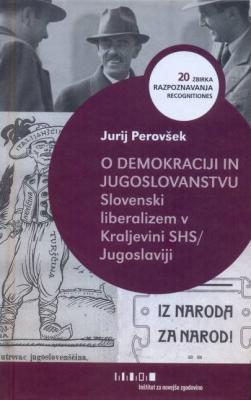On Democracy and Yugoslavism: Slovenian Liberalism in the Kingdom of SHS/ Yugoslavia
Keywords:
liberalism, political history, political ideas, Slovene politiciansSynopsis
The question of the ideological, political, social and national coexistence is one of the key conditions for the establishment of democracy in the national and international political community. This issue was also faced by the liberals after the political-party division of the Slovenian space in the end of the 19th century. Since the establishment of the liberal National Party for Carniola in 1894 until the beginning of World War II in Slovenia in 1941, as far as the question of the ideological guidelines of the Slovenian national-political development was concerned everyone had the right to practice religion or not. However, this was supposed to be a private matter and should not influence the people’s social and political actions. In line with this principled standpoint the liberals led a fierce cultural struggle against the Catholic political camp in the Austrian period, which was most evident in Carniola. Ideologically and politically they also strongly opposed the Marxist social-democratic workers’ movement. These ideological-political standpoints were in line with the socio-economic viewpoints of the Slovenian liberalism, which emphasised the bourgeois social exclusivism. The liberals never accepted either social democracy or Christian socialism, and they opposed the Catholic socio-economic activities even more. Throughout the Austrian period they kept arguing for social distinction, even if at the declarative level they emphasised the principle of equality of all social strata. They acknowledged one of the basic condiSummary On Democracy and Yugoslavism: Slovenian Liberalism in the Kingdom of SHS/ Yugoslavia o demokraciji in jugoslovanstvu_kor3.indd 265 20.12.2013 16:56:28 266 tions for the democratic and common management of public affairs and political life – the universal and equal right (of men) to vote – as late as in 1908. Until 1918 the Slovenian liberal policy also consistently strengthened the principle of total denial of one another, including their attitude towards the Jews. Namely, anti-Semitism as an inseparable aspect of the ideological character of the Slovenian liberal camp kept appearing and was preserved since the beginnings of the liberal camp’s organisation in the 1860s until its decline in the period between both World Wars. Anti-Semitism was also characteristic of the Catholic and Marxist camps. As far as the attitude towards the Germans and Italians was concerned, the liberals argued for the national co-habitation of Slovenians and these nations on equal terms.

Published
Print ISSN
License

This work is licensed under a Creative Commons Attribution-NonCommercial-NoDerivatives 4.0 International License.

